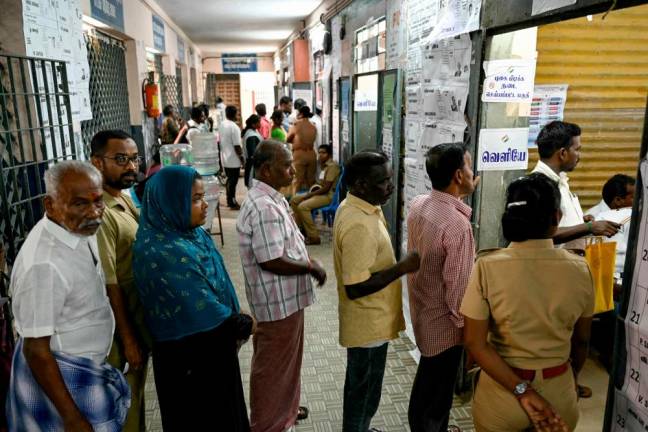THE economic procurement of marine commodities from fisheries is crucial to trade and consumption by Asean member states and is instrumental for the preservation of food security in the region, which is fundamental to the livelihood of millions of people and is increasing in demand.
However, the ever-growing depletion of marine resources threatens Asean’s marine industrial complex, exacerbating the region’s food insecurity.
The Asia Foundation found that 64% of the fisheries’ resource base in Asean is at a medium to high risk of significant depletion. Malaysia’s domestic fish supply is dwindling by about 20-30%, and importing marine products from member states is becoming more restricted, increasing food prices and worsening the shortage, which disrupts the country’s resources and the livelihood of millions. This issue requires restitution for both Asean and Malaysia.
A holistic interpretation of food security must be adopted to meet the demand of Southeast Asian consumers. Fisheries not only account for 9% of global fish exports but significantly depend on these collections internally.
The issues plaguing Asean serve to undermine maritime security and as a consequence asphyxiate the region’s food security. The region is experiencing significant stress in meeting demand due to disrupted supply chains and global economic stagnation. This calls for an immediate, concentrated policy resolution to solve the internal strife brought about in the area of maritime to ensure greater fortification for the foreseeable future.
Asean has demonstrated historic efforts to offset food insecurity by initiating security arrangements in its 2016-2020 fishery plan of action by enacting policy arrangements to strengthen food security.
However, bureaucratic incoordina-tion at the Malaysian domestic substrate and an ever-growing presence of outside threats and internal and geopolitical issues are overwhelming Asean’s regional cooperation at the international level, causing stagnation in the area of maritime security.
Immediate development in Malaysia and Asean security issues in the area of maritime policy is needed for the adoption of a consolidated and holistic framework that would strengthen pre-existing policy initiatives to ensure more efficacious conservation efforts as it better delineates and clarifies the marine responsibilities of member states.
There are significant challenges that continue to put Asean and Malaysia under significant duress. Maritime piracy instigated by foreign entities has economically ravaged the marine economy, with the exploitation of Malaysia’s exclusive economic zone, contributing dramatically to the nation’s food insecurity due to under management and weakening defence forces.
The effects of climate change have considerably worsened oceanic pollution, and weather disruptions have affected fish habitats and catches.
The Strategic Plan of Action on Asean Cooperation on Fisheries 2021-2025 is inadequate as there is yet to be the inclusion of policy manoeuvres promoting the recovery of fish stocks in the South China Sea. Maritime experts have advised Malaysia to consider the consolidation of a wider security framework as it suffers from under-developed international cooperation from its maritime neighbours, finding it strenuously difficult to thwart large-scale illegal fishing and address the ramifications of climate change.
An Asean Common Fisheries Policy, modelled after the European Union’s marine policies, would streamline and harmonise pre-existing policy initiatives to ensure greater coordination, incorporating precise, newfound strategies on conservation in order to preserve marine products.
An Asean Common Fisheries Policy has yet to be instantiated as it is still in its development stages but has shown potential to enhance marine conservation efforts if implemented as its newfound strategies gear towards the restitution of depleted fish stocks, the management of environmental catastrophes, and the combatting of pirates.
The success of which will benefit Malaysia and Asean as a whole, restoring marine commodities via a shift towards a mutually collaborative initiative as opposed to singular efforts orchestrated by individual member states with exhausted facilities. This will incentivise these nations to increase their participation as they are better equipped to address the threats of illegal fishing and climate change.
Therefore, a strategic partnership between Malaysia and the European Union (EU) policymakers to spearhead an Asean Common Fisheries Policy is imperative as such efforts have proved viable seeing that Asean has historically sought assistance from the EU for its fisheries policy framework under the Enhanced Regional EU-Asean Dialogue Instrument.
Asean should explore the framework that will bolster quintessential areas of maritime security, such as large-scale illegal and unregulated fishing as well as climate change impacts, to be better prepared for the emergence of future issues.
Illegal, unreported, and unregulated fishing (IUU) has caused member states to accumulate economic losses amounting to US$6 billion (RM26.8 billion). Asean has utilised particular frameworks to suppress these unlawful activities but has been deemed insufficient. It requires further incorporation of policies that ensure regional efforts to monitor illegal fishing are balanced for strategies to be efficacious.
An Asean Common Fisheries Framework to strengthen maritime security policies could follow the EU’s “zero-tolerance” model. This means refusing to import fishery products by issuing yellow and red cards to countries identified as instigators of illegal maritime encroachment in Asean territorial waters. The yellow and red cards can be rescinded if the country cooperates.
The policy framework would also encourage joint monitoring and surveillance by member states, and ongoing dialogue to identify parties contributing to the problem. This would help reduce the surge of IUU fishing, while exerting greater pressure on hostile parties to deter future incidents and find solutions to maritime conflicts.
The EU’s ban on foreign fish boats has been effective in reducing IUU fishing by 90% since 2014. The success of this policy is due to the collaborative efforts of EU member states in monitoring and enforcing penalties to deter illegal activity.
The EU’s Integrated Maritime Policy and Common Information Sharing Environment facilitate this joint surveillance by enabling secure and efficient data sharing across sectors and borders within the EU.
An Asean Common Fishery framework would promote a coordinated effort among member states to monitor maritime waters and impose strict penalties, using a “zero-tolerance” approach against parties that threaten the union’s maritime territorial integrity and contribute to existing strains on food security.
The framework aims to preserve the waters from illegal activity and mitigate the decline in marine extrapolation initiatives due to temperature differentials, which threatens future food security.
A report has demonstrated a potential decline of 40-60% in Asean’s marine extrapolation initiatives.
Upon critical analysis, the current policy framework appears to lack developed strategies that encourage and motivate regime actors to produce outputs in the service of sustainable development, particularly in improving the quality of climate change mitigation practices that affect fish habitats.
The commitments to reduce carbon emissions have decreased among Asean member states, hindering their progress towards net carbon neutrality. In contrast, the EU has imposed strict regulations on its member states to reduce carbon emissions and achieve climate neutrality by 2050, which emphasizes the urgency of climate change adaptation.
The current institutional framework of Asean lacks the force to encourage member states to abide by climate change policies. To address this, logistical support should be strengthened for countries that lack the capacity to increase maritime defence, and policies and objectives should be actively promoted. Economic incentives and trade agreements can also be used to incentivise member states to reduce greenhouse gas emissions and avoid the carbon price.
The EU’s Common Fisheries Policy can be adapted to ensure that the framework undergoes the necessary transformation to compel member states to curb their carbon emissions, mitigate rising sea levels, and preserve the security of maritime aquaculture, thereby stabilising food security.
A gradual adoption of a Common Fisheries Policy, led by a collaboration between the EU and Malaysia, could contribute to improving Asean’s maritime governance and mitigating threats to food security. While the implementation of this framework in all areas of maritime governance requires further review, certain policies could benefit Asean significantly if assiduously implemented.
Comments: letters@thesundaily.com













